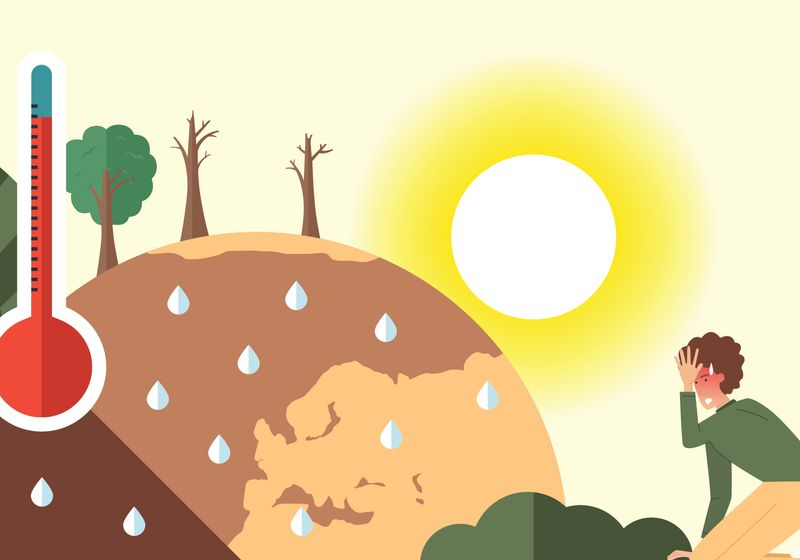While governments and business communities around the globe have been focused on avoiding the breakdown of healthcare systems and economies in the face of the COVID-19 pandemic, they have for the most part been ignoring another looming health issue: the effects of climate change.
In the US and elsewhere, climate change is not completely off the radar, but governments and the media have mostly focused on the issue as it pertains to worsening natural disasters, such as hurricanes, wildfires, flooding, drought, and extreme temperatures. Researchers and regulators have identified key emitters of greenhouse gases—not only fossil fuel use, but industrial agriculture, which currently produces approximately 18 percent of global greenhouse gas emissions—and have identified solutions to reduce these emissions. But what lacks appropriate scientific and political attention around the globe is the detrimental effects that climate change is having on the public’s health.
The World Health Organization (WHO) and the US Center for Disease Control (CDC) have issued publications that list many health issues that stem from climate change and forecast the sheer magnitude of mortality it will cause. The WHO expects there to be about 250,000 climate-related additional deaths per year worldwide between 2030 and 2050, attributable to malnutrition, malaria, diarrhea, and heat stress. To address this impending health crisis, there needs to be a coordinated effort among governments, non-governmental organizations (NGOs), and other entities engaged in protecting the health of the world’s population. But such a mobilization will necessitate broad public awareness and prioritization of the threat.
Some of the health problems wrought by a changing climate are obvious—air pollution can drive the spread of fungal pathogens, diminish cognitive and lung function, exacerbate asthma, and increase risk of cancer. Extreme temperatures can fuel heat stroke, and prolonged excessive heat can worsen cardiovascular, respiratory, and kidney disorders. And when precipitation fluctuates wildly, waterborne diseases, mold contamination, and respiratory infections such as pneumonia can all become more common. A warming climate can also fuel the geographic expansion of mosquitos, ticks, and other disease vectors, which can spread a range of debilitating illnesses from Lyme and West Nile Virus disease to chikungunya and Chagas disease. Images of drought- or disaster-stricken areas often show inhabitants suffering food shortages, malnutrition, and displacement. What is not captured by harrowing photographs are these more-diffuse processes set in motion by climate change.
Even less obvious are the plethora of mental and stress-related health issues that are linked to climate change. Natural disasters are associated with increased anxiety and post-traumatic stress, heightened suicide rates, hospitalizations for dementia, and even increased schizophrenia rates. Maternal and infant health is not spared: such disasters can lead to preterm birth, low birth weight, and other complications.
The impact of climate change on global health and on world economies cannot be relegated to scientific echo chambers.
While many medical professionals have called for more attention to the brewing climate health crisis, there are few action plans to tackle it. The dearth of concerted research and high-priority government policy hinders an effective response. The current pandemic squanders the opportunity to garner the public’s attention for this looming, longer-term emergency. The WHO has estimated that simply meeting the air pollution–reduction goals of the Paris Agreement, which was signed and went into effect in 2016, could save about a million lives a year worldwide by 2050. An editorial published in September 2021 in more than 200 medical and health journals worldwide stated that an increase of 1.5 degrees Celsius in global temperatures is the greatest threat to global public health. Medical professionals in the UK issued a similar call to action in February 2022 in a letter to the prime minister.
The proper response to these fresh alarm bells should be well-constructed policies that focus specifically on the health outcomes of climate change. The current lack of governmental focus on the health dimension of the climate issue not only imperils the general population but also underprepares doctors to point out such dangers to their patients. For example, research has shown that pregnant women are particularly vulnerable to heat waves. Warming events increase the likelihood of mothers going into premature labor, having a stillbirth, or birthing an infant with a low birth weight. The risks to the elderly and babies of an impending heat wave usually make headlines, but expectant mothers are not told that an extra 10 °F increases the risk of preterm birth by more than 8 percent. These climate-sensitive health risks disproportionately affect disadvantaged populations and vulnerable individuals, including children, people with underlying health issues, ethnic minorities, and displaced persons fleeing combat zones.
There needs to be a clarion call to confront the health problems that climate change is driving. The COVID-19 pandemic has demonstrated the need for governments, NGOs, businesses, and other entities to collaborate on health issues that challenge the entire planet. Mere publications by health organizations and professionals in prestigious journals have not been sufficient to alert the populace to the insidious dangers of climate change. For starters, the United Nations General Assembly, which has acted on other emergent global health issues such as antimicrobial resistance, should take immediate action by challenging member states to face the dangers to public health wrought by their inaction on climate change. The UN’s Intergovernmental Panel on Climate Change released a major report in late February, and one chapter details climate-related dangers to human health and wellbeing. The IPCC’s insights and recommendations to coordinate efforts to address these problems can help focus political and regulatory attention on this emergency.
When COVID-19 was declared a pandemic, global cooperation, while not always ideal and efficient, came to fruition. A unique partnership was mobilized between international health organizations, prominent scientists, and research institutions. This resulted in the Access to COVID-19 Tools (ACT) Accelerator. Its goal was to amalgamate expertise from around the world to invent, build, and share solutions to the pandemic. A similar approach can be deployed to address the health effects of climate change. Organizations including the WHO, the US Food and Drug Administration (FDA), the CDC, and similar bodies in other countries should set up a joint task force to establish a coordinated response to climate-related health issues.
Each hurricane, tsunami, and wildfire generates a tally of the lives immediately lost and the economic damage sustained. But seldom, if ever, does an estimate of the public health cost emerge from such tragedies. According to a May 2021 report by several organizations focused on global warming, climate-related healthcare costs in the US alone are already estimated at $820 billion annually. And this is likely to be too conservative, given the difficulty of estimating such expenditures. In fact, the US Environmental Protection Agency (EPA) and other federal science agencies follow the public health effects of climate change, but there is no such agency currently calculating the public health costs. One can only imagine the scope of the problem on a global scale. Therefore, it behooves an international organization to start tracking the global cost of not addressing the health impact of climate change. If the human cost is too diffuse and diverse to grasp, dollars-and-cents data should help get the world’s attention.
The impact of climate change on global health and on world economies cannot be relegated to scientific echo chambers. The public needs to demand that their governments come together to support sustained prioritization and funding for this health emergency.
Mark Kessel is the Chairman of FIND (Foundation for Innovative New Diagnostics), in Geneva, Switzerland. Rick Elbaum is an attorney in New York City who holds an LLM in Environmental & Energy Law from NYU Law School.








